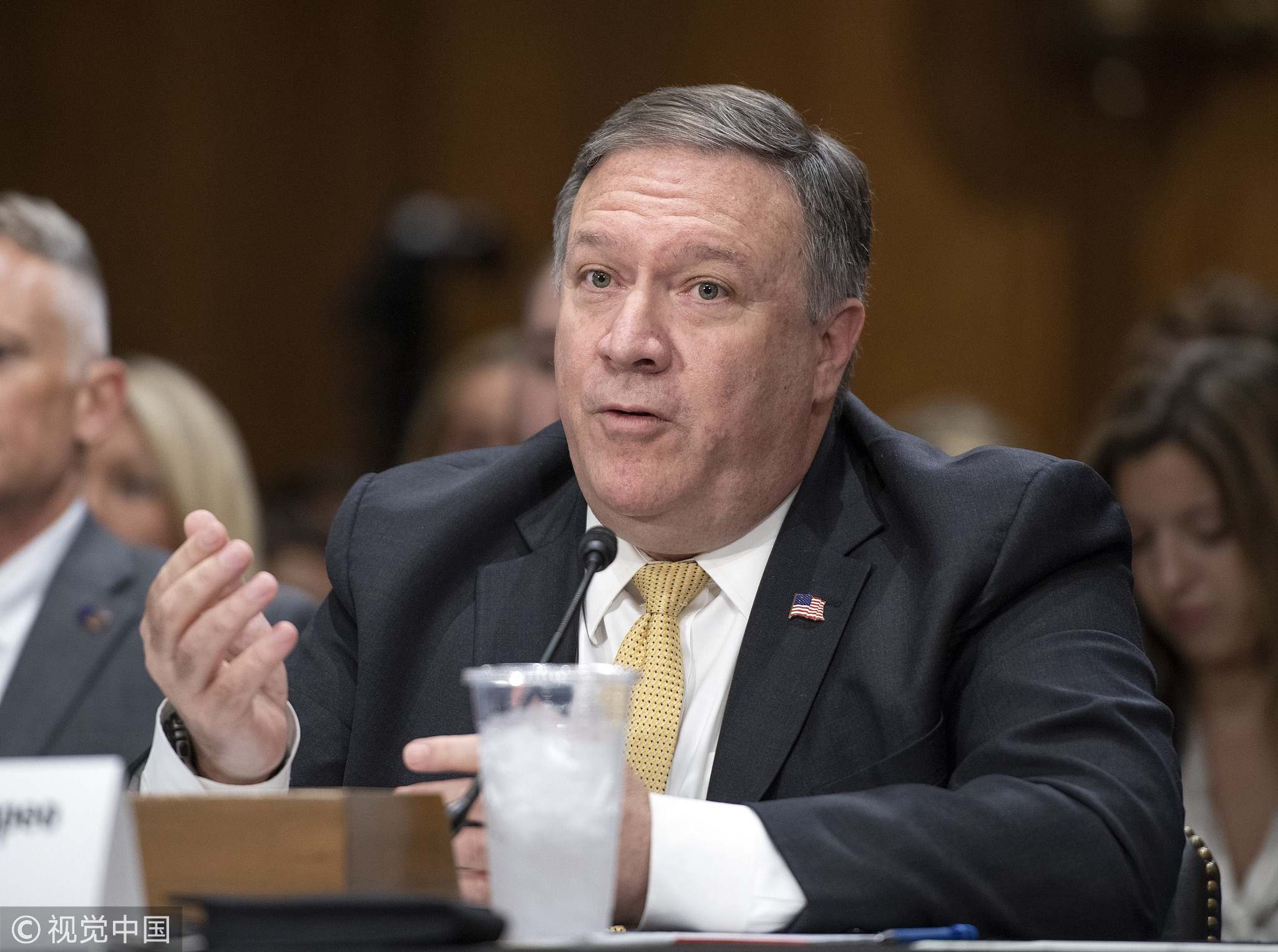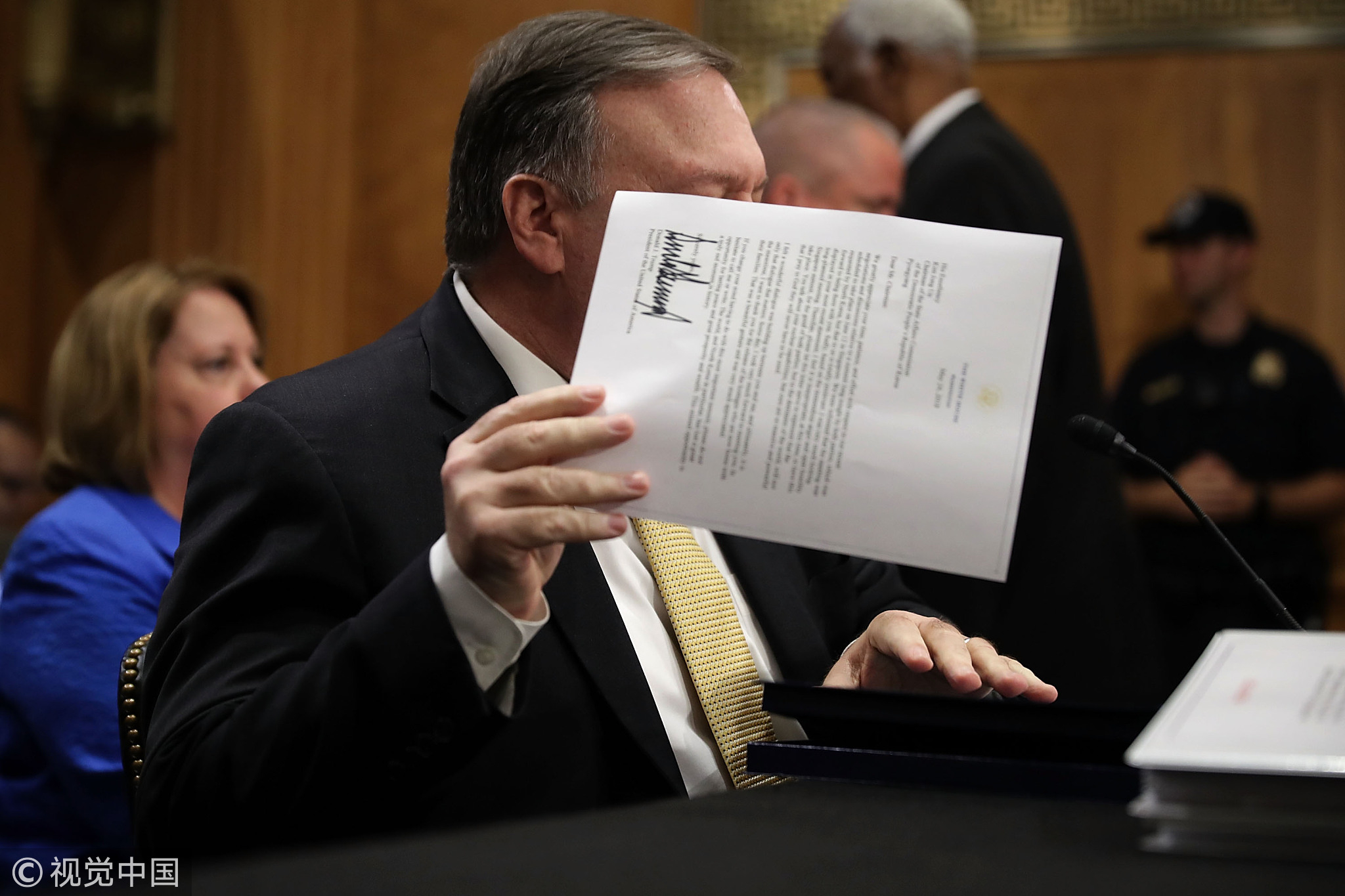Editor’s note: Li Nan is an associate research fellow at the Institute of American Studies in the Chinese Academy of Social Sciences. The article reflects the author's opinion, and not necessarily the views of CGTN.
The highly anticipated summit between the US and DPRK on June 12 has been cancelled, and the Korean Peninsula has once again become uncertain.
"I was very much looking forward to being there with you. Sadly, based on the tremendous anger and open hostility displayed in your most recent statement, I feel it is inappropriate, at this time, to have this long-planned meeting," Trump wrote to Kim. "Therefore, please let this letter serve to represent that the Singapore summit, for the good of both parties, but to the detriment of the world, will not take place."
Donald Trump gave up negotiations with the DPRK when he realized the complexity of the whole process. In the letter, he has threatened the DPRK with harder policies but also appealed for a second chance.

US Secretary of State Mike Pompeo appears before the US Senate Committee on Foreign Relations to "Review the FY 2019 State Department budget request" on Capitol Hill in Washington, DC, May 24, 2018. Prior to delivering his prepared remarks, Pompeo read a letter from US President Donald Trump to DPRK leader Kim Jong Un cancelling their planned summit in Singapore on June 12, 2018. /VCG Photo
US Secretary of State Mike Pompeo appears before the US Senate Committee on Foreign Relations to "Review the FY 2019 State Department budget request" on Capitol Hill in Washington, DC, May 24, 2018. Prior to delivering his prepared remarks, Pompeo read a letter from US President Donald Trump to DPRK leader Kim Jong Un cancelling their planned summit in Singapore on June 12, 2018. /VCG Photo
The cancellation of the summit revealed the strategic incoherence and chaotic, ill-informed process of President Trump and his team. In March, Trump accepted the US-DPRK summit without full discussions with his team.
Since then, US administrations at all levels have apparently failed to make adequate preparations, resulting in a loss of clear understanding on the denuclearization of the Korean Peninsula and details of various specific technologies.
On Monday, Vice President Pence suggested that Mr. Kim would be overthrown like Libyan strongman Moammar Gadhafi if he doesn't make a deal on US terms. "This will only end like the Libyan model ended if Kim Jong Un doesn't make a deal."
On Wednesday, the Secretary of State Pompeo said the US hadn’t made any concessions to persuade Kim to come to the negotiating table and did not intend to make any concessions in the future. But at same time, President Trump said he would not seek the Libya Model and will guarantee the DPRK security if the DPRK agrees to denuclearize themselves.
The lack of coordination between such decision-makers has caused the DPRK to have suspicions about the summit and the actual intentions of the US.
Also President Trump's cancellation of the summit has brought into question whether the US and the DPRK shared the same understanding of "denuclearization." The Trump administration envisioned a rapid process, which is called PVID and perhaps takes less than a year. The sanction relief would come only at the end. Kim Jong Un, however, emphasized a process of stage by stage in which sanction relief would come earlier. Since China, the DPRK and the ROK all supported a gradual process of confidence-building measures and Trump stood alone in calling for the immediate denuclearization of the DPRK, it was unlikely to be accepted by the DPRK.

US Secretary of State Mike Pompeo pulls out a copy of President Donald Trump's letter to DPRK leader Kim Jong Un before Pompeo testifies to the Senate Foreign Relations Committee in the Dirksen Senate Office Building on Capitol Hill on May 24, 2018 in Washington, DC. /VCG Photo
US Secretary of State Mike Pompeo pulls out a copy of President Donald Trump's letter to DPRK leader Kim Jong Un before Pompeo testifies to the Senate Foreign Relations Committee in the Dirksen Senate Office Building on Capitol Hill on May 24, 2018 in Washington, DC. /VCG Photo
Moreover, it is worth emphasizing that Trump’s announcement of withdrawing from the Iranian nuclear agreement has seriously damaged the American international reputation and pushed the DPRK to believe that Trump is not worthy of trust. Any agreement that the US and the DPRK reached could become wastepaper. Therefore, the deeply ingrained mistrust of the United States and the DPRK made it impossible for the United States and the DPRK to make positive interactions and implement any agreement they may reach.
With the Trump administration canceling the summit in Singapore, the Korean Peninsula is falling into a new round of uncertainties. A series of diplomacy around the Korean Peninsula will once again warm up. The coordinative role of third parties is indispensable, and China is undoubtedly a crucial country to play this role.
With China’s influence in the Korean Peninsula, China has the ability to influence both the United States and the DPRK so that the two countries can finally sit down and engage in dialogue.
Although the cancellation of the Singapore summit is a lost chance, it has also opened another window of opportunity. If all parties, especially the United States, can fully plan and act by flexibility, pragmatism and compromise, a peaceful and denuclearized peninsula will emerge.




